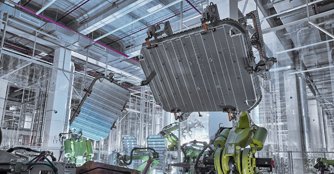Sustainable aluminum for battery housing of Audi e-tron
15 Oct 2018|892 views
With the Performance Standard certification, the Aluminium Stewardship Initiative (ASI) confirms that Audi meets the ASI requirements for industrial users of aluminium and sustainably designs and manufactures the aluminium components of the battery housing of the Audi e-tron.
For the assessment, independent third-party auditors carried out audits at the Audi plants in Gyor, Neckarsulm and Brussels. As the next step, Audi intends to ensure the sustainability of these components also in its supply chain. To those ends, the company plans to work specifically with partners that are also certified by the ASI.
Aluminium is an important material in an automobile but is very energy intensive in production.
Audi therefore places great value on the sustainability values and material stewardship of the materials it uses. "Audi stands for sustainability along the entire supply chain," stated Bernd Martens, Member of the Board of Management for Procurement and IT.
"The Aluminium Stewardship Initiative has created transparency with its new certification programme." Martens stated that the battery, as a major component of the new, all-electric Audi e-tron, was therefore just the beginning, and that Audi would gradually have its own development, procurement and production processes audited for as many aluminium components as possible at the company's plants worldwide.
He stated that in addition, Audi intended to ensure sustainability in the long-term by means of ASI-certified partners and their suppliers along their respective upstream supply chains.
Audi has been involved in the Aluminium Stewardship Initiative since early 2013. In recent years, the initiative has developed and launched its global sustainability standards. They include environmental, social and governance criteria, which apply to all stages of the process chain from the extraction of the raw material, bauxite, to processing and production and to recycling.
The material stewardship criteria requires, for example, that a company deals with the material in a resource-conserving way, prepares holistic lifecycle analyses and takes into consideration suitability for later repair and recycling when designing its products.
With the Performance Standard certification, the Aluminium Stewardship Initiative (ASI) confirms that Audi meets the ASI requirements for industrial users of aluminium and sustainably designs and manufactures the aluminium components of the battery housing of the Audi e-tron.
For the assessment, independent third-party auditors carried out audits at the Audi plants in Gyor, Neckarsulm and Brussels. As the next step, Audi intends to ensure the sustainability of these components also in its supply chain. To those ends, the company plans to work specifically with partners that are also certified by the ASI.
Aluminium is an important material in an automobile but is very energy intensive in production.
Audi therefore places great value on the sustainability values and material stewardship of the materials it uses. "Audi stands for sustainability along the entire supply chain," stated Bernd Martens, Member of the Board of Management for Procurement and IT.
"The Aluminium Stewardship Initiative has created transparency with its new certification programme." Martens stated that the battery, as a major component of the new, all-electric Audi e-tron, was therefore just the beginning, and that Audi would gradually have its own development, procurement and production processes audited for as many aluminium components as possible at the company's plants worldwide.
He stated that in addition, Audi intended to ensure sustainability in the long-term by means of ASI-certified partners and their suppliers along their respective upstream supply chains.
Audi has been involved in the Aluminium Stewardship Initiative since early 2013. In recent years, the initiative has developed and launched its global sustainability standards. They include environmental, social and governance criteria, which apply to all stages of the process chain from the extraction of the raw material, bauxite, to processing and production and to recycling.
The material stewardship criteria requires, for example, that a company deals with the material in a resource-conserving way, prepares holistic lifecycle analyses and takes into consideration suitability for later repair and recycling when designing its products.
Latest COE Prices
February 2026 | 1st BIDDING
NEXT TENDER: 20 Feb 2026
CAT A$106,320
CAT B$110,890
CAT C$74,801
CAT E$116,000
View Full Results Thank You For Your Subscription.



















